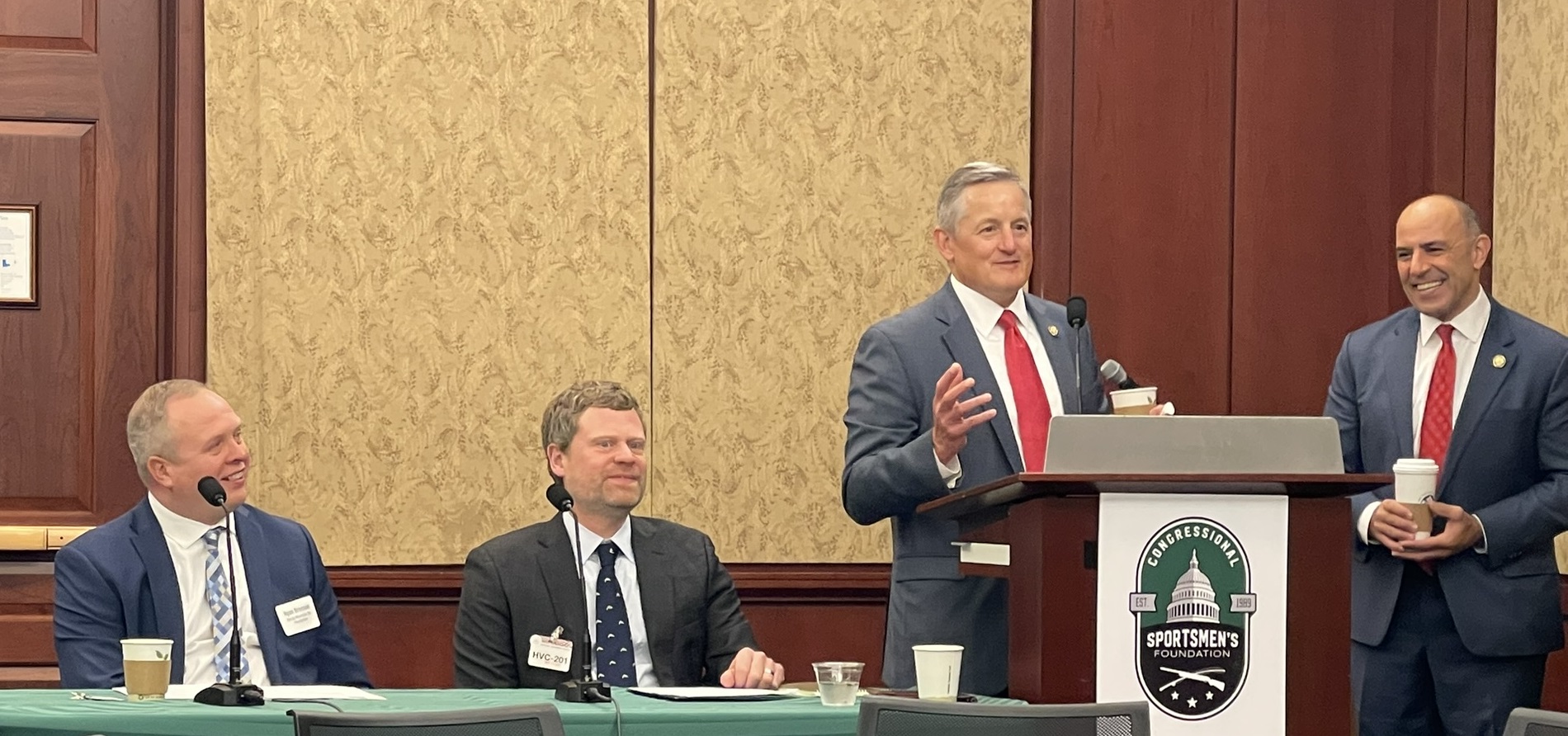Photo info – RMEF Director of Government Affairs Ryan Bronson (far left), Rep. Bruce Westerman (R-AR) (behind podium) and Rep. Jimmy Panetta (D-CA) (far right). Westerman and Panetta are co-chairs of the Congressional Sportsmen’s Caucus.
As development continues to expand, elk and other wildlife need help if they are to thrive. The Rocky Mountain Elk Foundation delivered that message during a recent visit to Washington DC. Appearing at the Congressional Sportsmen’s Foundation breakfast briefing at the U.S. Capitol Visitor Center, RMEF emphasized the importance of conserving migration corridors.
“Why is this important? Many species of wildlife need to move seasonally to meet their life cycle needs, including birds (waterfowl) and big game animals like elk, wild sheep, mule deer and pronghorns,” said Ryan Bronson, RMEF director of government affairs. “Enabling these natural migrations is critical to these species’ success. Scientists using modern technology are mapping these routes and identifying choke points that provide state wildlife agencies, federal land agencies and conservation groups the ability to target the highest value areas to protect and enhance.”
That emphasis on migration habitat is one of seven policy areas with specific recommendations laid out for the new Congress and Trump Administration in Wildlife in the 21st Century, a detailed document prepared by the 52 sporting-conservation organizations that make up the American Wildlife Conservation Partners (AWCP). RMEF is an AWCP member and Bronson is chair of the AWCP Wildlife Migration Working Group.
During his remarks, Bronson applauded the first Trump Administration for establishing Secretarial Order 3362 focused on migration corridors and its accompanying habitat, and the Biden Administration for continuing that policy and expanding it to the U.S. Department of Agriculture. Bronson called on Congress to codify, authorize and fund the migration program via the Wildlife Movement Through Partnerships Act. He also emphasized an AWCP recommendation that Congress includes the Federal Highway Crossing Pilot Program, which incentivizes state and tribal projects to plan and construct wildlife crossings, when it reauthorizes the transportation bill
Bronson also plugged the importance of active management of federal lands to improve wildlife habitat and make forest and grasslands less prone to catastrophic fire.
“AWCP has 17 specific recommendations in the w21 document focused on deterring litigation, expanding non-federal partnerships to get work done, elevating habitat as a priority in decision making, and adequately funding the important functions that make our federal lands thrive. Legislation addressing these priorities includes the bipartisan Fix Our Forests Act, the Cottonwood Fix, the Farm Bill, reconciliation and appropriations bills,” said Bronson.
During their trip, the RMEF delegation attended hearings by the House Natural Resources Committee, Subcommittee on Water, Wildlife & Fisheries about H.R. 845, Pet and Livestock Protection Act of 2025 (wolf delisting) and H.R. 1897, ESA Amendments Act of 2025 (adjustments to Endangered Species Act). They also bumped into Brian Nesvik, U.S. Fish and Wildlife Service director nominee, who was before the Senate Environment and Public Works Committee for his confirmation hearing. RMEF wrapped up its lobby trip with a presentation to the Congressional Western Caucus about the threat of anti-hunting and animal rights’ groups.
(Photo credit: Rocky Mountain Elk Foundation)
